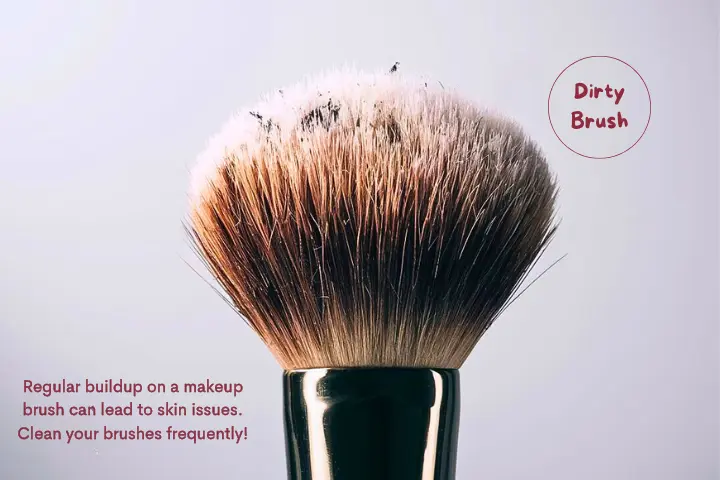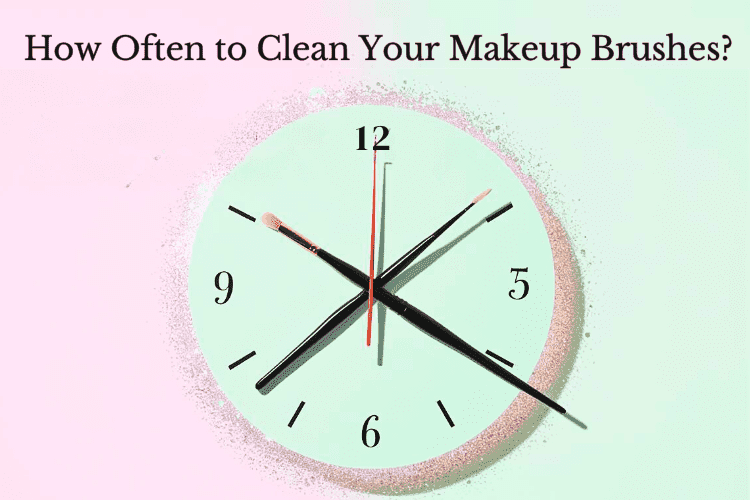Alright, beauties, let’s talk about something that doesn’t get nearly enough love in our beauty routines—cleaning makeup brushes. I know, I know, it’s not as fun as playing with your latest eyeshadow palette or perfecting that winged liner, but trust me, this is one step you can’t afford to skip.
Dirty brushes are more than just a minor inconvenience; they can wreak havoc on your skin and makeup game. So, you must how often cleaning you actually need to do it? that’s what we discuss today.
The Importance of Cleaning Makeup Brushes
Skin Health
Dirty brushes are a breeding ground for bacteria. They harbor dirt, oil, dead skin cells—basically, everything you don’t want touching your face. Every time you use a dirty brush, you’re transferring all that gunk back onto your skin, leading to clogged pores, breakouts, and potentially more serious skin issues. Regular cleaning helps remove these impurities and keeps your complexion clear and healthy.
Makeup Application
Ever noticed your foundation looking a bit patchy or your eyeshadow not blending as seamlessly as it used to? That’s likely because your brushes are caked with old makeup, oil, and bacteria. When your bristles are coated in old makeup, oil, and bacteria, they can’t pick up and distribute fresh product evenly. Clean brushes ensure your makeup goes on flawlessly every time, giving you that seamless finish we all crave.
Brush Lifespan
Let’s be real—quality makeup brushes aren’t cheap. Regular cleaning can extend the life of your brushes by preventing damage from product residue and bacteria. Neglecting to clean them can cause the bristles to become stiff, discolored, and even shed prematurely. This means you’ll have to replace them more often.
Frequency of Cleaning

So, how often should you actually clean your brushes? The answer isn’t one-size-fits-all, but here are some general guidelines to keep in mind.
General Recommendations
Daily Wipe-Down: After each use, give your brushes a quick wipe-down with a makeup brush cleaning solution or a damp microfiber cloth. This helps remove excess product and prevents buildup between deeper cleanings. It takes just a minute or two but can significantly extend the time between thorough cleanings.
Deep Cleaning: Every 1-2 weeks, you should do a more thorough deep clean to remove all the product buildup and kill any bacteria that have accumulated in the bristles. Brushes that are used daily or for heavier makeup application may need to be deep cleaned even more frequently.
Specific Brush Types
Foundation Brushes: These should be cleaned at least once a week. They accumulate more oil and product residue from being used on your face. Frequent deep cleaning helps maintain their ability to apply foundation seamlessly and prevent the transfer of bacteria.
Powder Brushes: These can be cleaned every 2 weeks, as they are less prone to oil buildup compared to face brushes. Their primary purpose is to distribute powder, so they don’t require as frequent cleaning but can still harbor bacteria. Regular cleaning keeps them in good condition.
Eye Brushes: These smaller brushes used around the delicate eye area should be cleaned at least once a week. The eyes are more sensitive to bacteria, so keeping these brushes extra clean is important.
Cleaning Methods
Now that you know how often to clean your brushes, let’s talk about the best way to do it. Here’s a simple step-by-step guide to get those bristles squeaky clean.
Step-by-Step Guide
- Wet the Bristles: Start by rinsing the brush hair under lukewarm water. Be careful to avoid the handle and ferrule (the metal part that connects the bristles to the handle) to prevent water damage.
- Apply Cleanser: Use a gentle, sulfate-free makeup brush cleaner, baby shampoo, or mild liquid dish soap. Place a drop of the cleanser in the palm of your hand and swirl the brush in it to create a lather. Avoid harsh cleansers with high alcohol content, as they can dry out and damage the bristles.
- Rinse Thoroughly: Rinse the soapy brush under running water until the water runs clear, indicating all the product and dirt have been removed. Be sure to rinse out every last bit of cleanser to prevent any residue from being left behind.
- Dry the Brushes: Lay the brushes flat with the bristles hanging off the edge of a counter or table to dry completely overnight. Avoid letting the brushes dry on a towel, as this can lead to mildew buildup. You can also use a clean paper towel or microfiber cloth to gently blot the bristles and speed up drying.
Recommended Cleaning Products
When it comes to choosing the right products for cleaning your brushes, here are some top picks:
- Makeup Brush Cleaners: Look for gentle, alcohol-free formulas like Sephora Collection Vera Mona Color Switch Brush Cleaner, Parian Spirit Professional Makeup Brush Cleaner, or the Sigma Spa Brush Cleaning Mat. These are designed specifically to effectively clean brushes without damaging the bristles.
- Shampoos: Baby shampoo, sulfate-free shampoo, and even mild liquid dish soap can work well for deep cleaning brushes. Avoid harsh cleansers with high alcohol content, as they can dry out and damage the bristles over time.
- Cleaning Mats: Special cleaning mats and gloves, like the Sigma Spa 2X Brush Cleaning Glove, can help with deep cleaning by providing different textures to really work the product out of the bristles. The grooves and ridges help lift out more dirt and oil.
More Tips
- Avoid Submerging: Fully submerging the brushes in water can damage the glue that holds the bristles in place, leading to shedding. Stick to rinsing the bristles only, being careful to avoid getting the handle and ferrule wet.
- Dry Correctly: Laying the brushes flat with the bristles hanging off the edge allows them to dry thoroughly without water seeping into the ferrule and handle. This prevents mildew and extends the life of the brushes. You can also use a brush drying stand or rack to keep them upright as they dry.
- Disinfect Regularly: In addition to regular cleaning, you should disinfect your brushes every 3-4 weeks using a brush sanitizing spray or 70% isopropyl alcohol. This helps kill any lingering bacteria that regular cleaning may have missed.
By following these guidelines, you’ll keep your brushes in top condition and ready to create flawless makeup looks every time. Prioritizing brush hygiene is an essential step in any beauty routine. So, next time you’re tempted to skip cleaning your brushes, remember: your skin and makeup will thank you!

